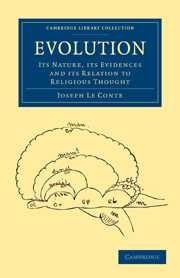Book contents
- Frontmatter
- PREFACE TO THE SECOND EDITION
- PREFACE TO THE FIRST EDITION
- Contents
- PART I WHAT IS EVOLUTION?
- PART II EVIDENCES OF THE TRUTH OF EVOLUTION
- PART III THE RELATION OF EVOLUTION TO RELIGIOUS THOUGHT
- CHAPTER I INTRODUCTORY
- CHAPTER II THE RELATION OF EVOLUTION TO MATERIALISM
- CHAPTER III THE RELATION OF GOD TO NATURE
- CHAPTER IV THE RELATION OF MAN TO NATURE
- CHAPTER V THE RELATION OF GOD TO MAN
- CHAPTER VI THE OBJECTION THAT THE ABOVE VIEW IMPLIES PANTHEISM, ANSWERED
- CHAPTER VII SOME LOGICAL CONSEQUENCES OF THE DOCTRINE OF THE DIVINE IMMANENCY
- CHAPTER VIII RELATION OF EVOLUTION TO THE IDEA OF THE CHRIST
- CHAPTER IX THE RELATION OF EVOLUTION TO THE PROBLEM OF EVIL
- Index
CHAPTER II - THE RELATION OF EVOLUTION TO MATERIALISM
Published online by Cambridge University Press: 29 August 2010
- Frontmatter
- PREFACE TO THE SECOND EDITION
- PREFACE TO THE FIRST EDITION
- Contents
- PART I WHAT IS EVOLUTION?
- PART II EVIDENCES OF THE TRUTH OF EVOLUTION
- PART III THE RELATION OF EVOLUTION TO RELIGIOUS THOUGHT
- CHAPTER I INTRODUCTORY
- CHAPTER II THE RELATION OF EVOLUTION TO MATERIALISM
- CHAPTER III THE RELATION OF GOD TO NATURE
- CHAPTER IV THE RELATION OF MAN TO NATURE
- CHAPTER V THE RELATION OF GOD TO MAN
- CHAPTER VI THE OBJECTION THAT THE ABOVE VIEW IMPLIES PANTHEISM, ANSWERED
- CHAPTER VII SOME LOGICAL CONSEQUENCES OF THE DOCTRINE OF THE DIVINE IMMANENCY
- CHAPTER VIII RELATION OF EVOLUTION TO THE IDEA OF THE CHRIST
- CHAPTER IX THE RELATION OF EVOLUTION TO THE PROBLEM OF EVIL
- Index
Summary
It is seen in the sketch given in the previous chapter that, after every struggle between theology and science, there has been a readjustment of some beliefs, a giving up of some notions which really had nothing to do with religion in a proper sense, but which had become so associated with religious belief as be to confounded with the latter—a giving up of some line of defense which ought never to have been held because not within the rightful domain of theology at all. Until the present the whole difficulty has been the result of misconception, and Christianity has emerged from every struggle only strengthened and purified, by casting off an obstructing shell which hindered its growth. But the present struggle seems to many an entirely different and far more serious matter. To many it seems no longer a struggle of theology, but of essential religion itself— deadly life-and-death struggle between religion and materialism. To many, both skeptics and Christians, evolution seems to be synonymous with blank materialism, and therefore cuts up by the roots every form of religion by denying the existence of God and the fact of immortality. That the enemies of religion, if there be any such, should assume and insist on this identity, and thus carry over the whole accumulated evidence of evolution as a demonstration of materialism, although wholly unwarranted, is not so surprising; but what shall we say of the incredible folly of her friends in admitting the same identity!
- Type
- Chapter
- Information
- EvolutionIts Nature, its Evidences and its Relation to Religious Thought, pp. 284 - 296Publisher: Cambridge University PressPrint publication year: 2009First published in: 1898



